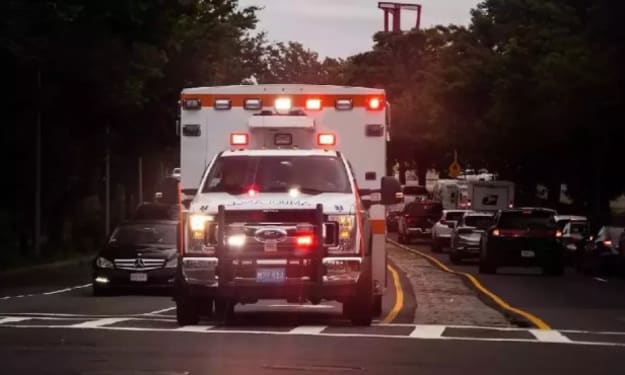Non-Emergency Transport Services: The Importance of Safe Travel
Importance of Safe Travel

Transportation is a vital aspect of modern life, and it plays a significant role in ensuring people can access healthcare services. Non-emergency transport services offer a lifeline to individuals who require assistance with transportation to medical appointments, follow-up care, or treatment centers. These services provide an essential service to patients who are not in a life-threatening situation but still require medical care. In this article, we will explore the importance of non-emergency transport services, their benefits, and the challenges that arise in their provision.
What are Non-Emergency Transport Services?
Non-emergency transport services are given to people who don’t need immediate medical attention but still need help going to doctor’s appointments, aftercare appointments, or treatment facilities. For patients who are unable to drive themselves, need specialized transportation, or cannot afford the expense of conventional transportation options, these services are essential. Governmental agencies, for-profit businesses, or unpaid volunteers can all offer non-emergency transportation services.
Benefits of Non-Emergency Transport Services
The advantages of non-emergency transport services for patients and medical professionals are numerous. First and foremost, these services make sure that everyone in need of medical care can get it, regardless of whether they have a car or money for a ride. This makes it possible for those who need ongoing medical care to go to their appointments on time, improving their health outcomes.
Second, non-emergency transportation services lighten the load on ambulance services. Patients are less likely to need emergency medical care as a result of missing or delayed appointments when they have access to non-emergency transport services. This lessens the need for emergency medical services while yet making sure that those who truly need them may access them.
Thirdly, non-emergency transport services offer persons with impairments or medical issues a safer and more comfortable transit choice. These services frequently include customized cars that can carry people who have mobility problems, medical equipment, or medical conditions that call for particular care.
Challenges in the Provision of Non-Emergency Transport Services
Despite the benefits of non-emergency transport services, there are several challenges that arise in their provision. The first challenge is funding. Non-emergency transport services can be expensive to provide, and many organizations struggle to secure the necessary funding to maintain these services. This can lead to a reduction in services or an inability to provide services to patients who need them.
The second challenge is the availability of trained staff. Non-emergency transport services require trained drivers who can handle medical equipment, provide assistance to patients, and respond to medical emergencies. Finding and retaining qualified staff can be challenging, especially in rural or remote areas.
The third challenge is coordination with healthcare providers. Non-emergency transport services must coordinate with healthcare providers to ensure that patients are transported to the correct location and at the right time. This requires efficient communication between the transport service and healthcare providers, which can be difficult to achieve in some cases.
Improving Non-Emergency Transport Services
To address the challenges in the provision of non-emergency transport services, several measures can be taken. Firstly, increased funding can help to ensure that non-emergency transport services are available to all patients who need them. Governments and private organizations should prioritize funding for non-emergency transport services to ensure that they are adequately resourced.
Secondly, training programs can be developed to increase the number of qualified drivers available for non-emergency transport services. These programs should be designed to provide drivers with the necessary skills and knowledge to handle medical equipment, provide assistance to patients, and respond to medical emergencies.
Thirdly, technology can be used to improve coordination between non-emergency transport services and healthcare providers. Mobile applications and online platforms can be developed to facilitate communication between the two parties, ensuring that patients are transported to the correct location and at the right time.
Non-emergency transport services, which provide transportation to people who need medical attention but do not require emergency care, have grown to be a crucial component of the healthcare sector. For elderly and disabled people who might be unable to drive or use public transportation, this service is crucial. Non-emergency transport services, which are gaining popularity in the healthcare sector, provide a secure and comfortable substitute for conventional transportation techniques. This article will discuss the value of non-emergency transportation services and how they might help the elderly and the disabled.
Non-emergency transport services are available through a variety of different providers, including private companies, government agencies, and non-profit organizations. These services can be provided through a variety of different vehicles, including vans, buses, and other specialized vehicles. Depending on the provider, non-emergency transport services may be provided on a one-time basis or on a recurring basis.
Another benefit of non-emergency transport services is that they provide additional assistance and support during transportation. Many elderly and disabled individuals may require assistance getting in and out of vehicles, as well as during the transportation process. Non-emergency transport services provide trained staff who are experienced in providing this type of assistance, which can help to ensure a safe and comfortable transportation experience.
Non-emergency transport services can also be more reliable than traditional transportation methods. Many providers offer on-time guarantee, ensuring that individuals arrive at their appointments on time. This can be particularly important for medical appointments, where punctuality is essential.
Types of Non-Emergency Transport Services
Non-emergency transport services are available in a variety of different types, depending on the needs of the individual. Some of the most common types of non-emergency transport services include:
Wheelchair Transport Services: Wheelchair transport services are designed for individuals who require a wheelchair for mobility. These services typically use specialized vehicles that are designed to accommodate wheelchairs and provide additional assistance during transportation.
Stretcher Transport Services: Stretcher transport services are designed for individuals who require a stretcher for transportation. These services typically use specialized vehicles that are equipped with stretchers and provide additional assistance during transportation.
Ambulatory Transport Services: Ambulatory transport services are designed for individuals who are able to walk or use a cane, walker, or other mobility aid. These services typically use vans or buses that are equipped with ramps and other accommodations to assist individuals during transportation.
Long-Distance Transport Services: Long-distance transport services are designed for individuals who require transportation over long distances. These services typically use specialized vehicles that are equipped with amenities to ensure a comfortable transportation experience.





Comments
There are no comments for this story
Be the first to respond and start the conversation.